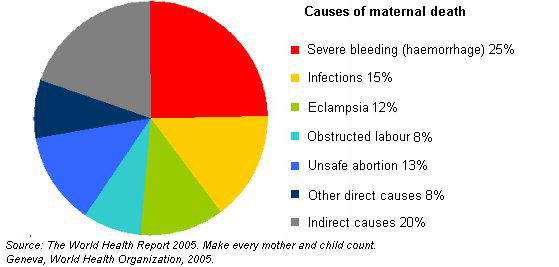Guest blog by Dr. Jennifer Hirshfeld-Cytron, Reproductive Endocrinology and Infertility Fellow, Department of Obstetrics and Gynecology, Northwestern Memorial Hospital
The Obstetrics and Gynecology Grand Rounds this morning was given by past FIGO (International Federation of Gynecology and Obstetrics) and previous chairman of the department, Dr. John Sciarra. He provided an incredibly informative and moving description of the global issues affecting women, particularly in the developing world. He highlighted the issues of maternal mortality, maternal morbidity, STDs, cervical cancer, and education inequality.
For instance, in Afghanistan, 1 in 6 women will DIE from pregnancy related complications compared to 1 in 4100 in the developed world. Pregnancy related complications include: abortion related deaths, hemorrhage, thrombotic events and eclampsia (see below). 20.5 million unsafe abortions occur each year worldwide and account for 60,-80,000 deaths.
Furthermore, HIV/AIDS accounts for 11% of worldwide deaths with approximately 47 percent of the 34.3 million adults living with HIV/AIDS being women. Cervical cancer, a preventable cancer with appropriate screening, sex education and potentially the vaccine, affects 200,000 women worldwide and is second only to breast cancer in incidence. Cervical cancer screening in the developed world centers on cytology, which is not available in the developing world. He further highlighted the inequities of women. Worldwide women work 66% more than men but receive only 15% of the income. Illiteracy in parts of the developing worth is greater than 65% for women. This just begins to highlight the complicated issue of providing appropriate family planning education to the developing world.
These staggering and incredibly disturbing statistics leave us with only one question; how can we raise the status of women worldwide? Efforts are being done to partner developed with developing world medical schools to increase technical skills for the care of women, such as safe abortions. A website (www.glowm.com) has been started by Dr. Sciarra and others providing education in the form of book chapters and how-to videos to begin to enhance knowledge to the developing world. Access is huge problem for women and foundations such as the Bill and Melinda Gates Foundation are working towards these and other efforts. In short, get involved.
As Mahmoud Fathalla, past president of the International Federation of Gynecology and Obstetrics, said: "Women are not dying because of diseases we cannot treat. They are dying because societies have yet to make the decision that their lives are worth saving."


Comments
Pages